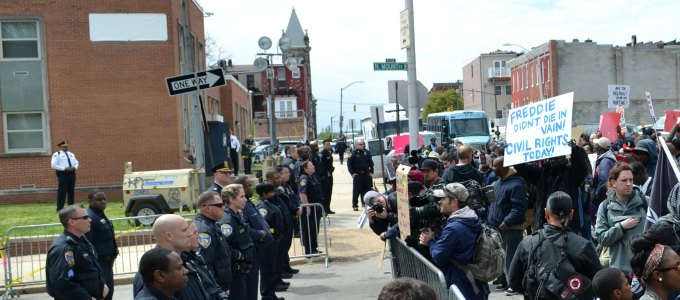Baltimore streets filled with protests in response to Freddie Gray's death, like this one in front of the Baltimore Police Department Western District building. (Photo courtesy of Wikimedia Commons)
I knew as soon as I saw the article that it would go viral. Angry black woman: check. Fighting: check. Child abuse — of a sort: check. How could it lose?
Sure enough, the media took the image of Toya Graham, a mother at the end of her tether, and made her the face of the Baltimore riots. She even had her own hashtag: #momoftheyear. Many called her a hero, and suggested that if more parents took their duties as seriously as she did, the riots might not have happened.
But perception is a funny thing. Another black young man had just lost his life at the hands of the police. Why was the media so eager to splash this image across every media outlet?
Go back to my lede. That list says it all. The world is familiar with specific images for minorities and for women. These images promote comfort, certainty and perpetuate a cycle of behavior that lead to inequities, bias, cruelty and, too often, death. Essentially, the unenlightened in the world see this scared out of her mind black woman and translate her behavior to: Their parents beat them, why shouldn’t the police? His own mother thinks nothing of going upside his head while screaming her head off; why should the police head one of their cries?
That’s why so many were so eager to entertain the idea that 25-year-old Freddie Gray — the catalyst for the Baltimore riots and Graham’s episode and the black man who died earlier this week from a fatal spinal injury incurred while in police custody — might have harmed himself. It would make sense, no? Black men are used to violence. It starts in the home. It’s not a far walk to suggest one might harm himself and then blame the police.
I’ll give you another example; this one less horrible, I promise. Think of a woman in the workplace. Smart, professional, day in and day out — this lady ignores the slights and dings, the sexist jokes, male co-workers brushing too close and accidentally touching her breasts or ass while supposedly going about their business. She keeps a stiff upper lip, even as she’s passed over for promotions while less qualified male peers snap up corner office and VP title after corner office and VP title.
One day, she offers an idea in a meeting, and is again ignored. She’s like, what is it? Am I Mindy Kaling invisible in this place or what? Later in the week, it happens again in another meeting. But now, tired and annoyed at being repeatedly ignored, only to have her ideas stolen and rehashed by men who are then praised for their creativity, she bursts out. “I just said the exact same thing only better, and you ignored me.”
Silence reigns. The men look at her, and she can see on their faces, “Listen to this overly emotional, crazy woman. Could she be any less professional, any less suited to be here in this meeting with us?”
Needless to say, Ms. Lady is not going to get that next promotion. She’ll be lucky if she doesn’t have to endure a long, unnecessary lecture from her supervisor on her lack of professionalism. Worse, years of perfect behavior have been wiped out. She’ll hence forth be known as she who has random outbursts in the middle of meetings.
This is why I shook my head at Toya Graham. I know she was scared. I know why she behaved that way. I can’t put myself in her shoes. In the height of so much emotion, to look for her child amid a smoky mob of chaos and violence, to see her child in danger, to know that he likely did not realize the extent of that danger — she did what she felt she had to do.
But black people, minorities, women — we can never forget how closely the world watches us. That camera is always on, and it doesn’t always record the truth. It records and plays back a perception only loosely based on reality.
We can never forget how eager the world is to attach premade labels to our foreheads and slot us into easily recognizable boxes marked: “Please lock up quickly — and occasionally for no real reason — without using a seatbelt”; please “ignore my cries for attention”; and definitely, “Do not promote. Not leadership material.”
Many were savvy enough to see Graham’s anger for what it was. They associated meaning and nuance to that now legendary video rather than simply taking it at face value. This wasn’t evidence of tough love. It was fear. Graham herself said she did not feel like a hero. She was just scared, and she snapped. But just as many others looked at that image and felt satisfied confirmation.
See?















